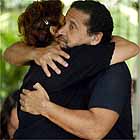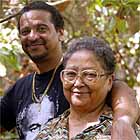|
 |
|
Esta página no está disponible en español. Orlando SentinelFreed Man Relishes His 2nd ChanceBy Iván RománJanuary 27, 2002
Together again. ---------- (PHOTOS: GIULIANO DE PORTU/FOR THE ORLANDO SENTINEL) MAUNABO, Puerto Rico -- Three weeks ago, Juan Roberto Melendez was a dead man walking. This morning, he will awaken to the sweet sound of crowing roosters outside his childhood home here -- no longer tormented about his date with death.? Melendez is not only a free man, he's a new man -- slowly suppressing that familiar sense of dread fueled during 17 years, eight months and one day on Florida's death row. On Jan. 4, a Florida judge declared he had been unfairly convicted -- a finding that led to his release and renewed doubts about the death penalty. The news spurred a hero's welcome in his hometown, topped off with his mother's home cooking in the seaside hills where he played as a child. Now, the 22nd man freed from Florida's death row spends as much time as possible outside. He smokes cigars at his "favorite place," a dead tree trunk in the back yard. He watches the leaves rustling in the wind -- appreciating the scene as few others can. ---------- Family reunion. ---------- He talks to old classmates and well-wishers in his driveway, under the sun. His mission, for the time being, is quite extraordinary: to leave behind not only the condemning of his body, but the jailing of his mind. "You can only live off memories and nostalgia in there -- nothing else," said Melendez, blowing smoke from his cigar. "They don't have to kill you. They're killing you day by day. They're killing you mentally if you're not careful." Melendez talked about the dull and dreary days on death row -- how, through the years, he had been given less and less to do during the four hours a week he was allowed to leave his 6-by-9-foot cell. The knitting and crafts he made for relatives, or to make money, were taken away. So were the weights he lifted in the yard to release the tension and frustration over being locked up for a crime he insists he didn't commit.
QUOTE: 'You can only live off memories and nostalgia in there -- nothing else.' Juan Roberto Melendez
"Every day it's the same thing over and over -- grinding in here," he said, pointing to his right temple. "That fear of dying in there with none of your family around you or none of the old friends you love. Thinking that you'll never see your mother again. Thinking that you'll never see your children again. You have to fight that tension every day and find a way out of it or you go crazy." Melendez, a Brooklyn native who grew up in Puerto Rico, talked about the help and moral support he received from fellow death-row inmates -- people such as 47-year-old Amos King, condemned more than 20 years ago. Accused in fatal shooting There are few people on death row who will admit to being guilty. But there likely are few as adamant as Melendez, who insisted that he did not shoot Auburndale beauty-salon owner Delbert "Mr. Del" Baker in the head after a supposed accomplice slit his throat in 1983. Defense attorneys and the judge who released Melendez say he was convicted in 1984 at the age of 33 with no physical evidence linking him to the crime and testimony from questionable witnesses. After several rounds of appeals were denied over the years, it was his appellate attorneys' doggedness that ended up setting Melendez free just as time was running out.
Together again. ---------- Investigator Rosa Greenbaum, who worked with the appellate team, tracked down attorney Roger Alcott, who had defended Melendez in 1984, and discovered a transcript of a jailhouse interview taped about a month before the trial. In the interview, witness Vernon James admitted to being involved in the Baker murder and said Melendez was not even at the scene. Armed with a transcript of James' confession, Melendez's lawyers talked to some 20 people James had told about the slaying. Some of them, including a law-enforcement officer, remembered that James had confessed. In yet another break for Melendez, a prosecution witness who had testified to driving him to the beauty salon on the day of the murder later recanted. At the trial, the prosecution's star witness, David Luna Falcon, testified that Melendez confessed to him. What prosecutors didn't reveal was that Falcon was a paid informant for the police and negotiated a deal in exchange for his testimony. After studying all the new information, Circuit Judge Barbara Fleischer in Tampa ruled in December that prosecutors had withheld evidence pointing to James, who has since died, that would have cast doubt on Melendez's guilt. She ordered a new trial. On Jan. 4, Polk County prosecutors decided they did not have enough evidence to retry Melendez, and he was released that afternoon. ---------- Soaking in the sun. ---------- Ecstatic, Melendez used his attorney's cell phone to call his mother, Andrea Colon Rodriguez, in Puerto Rico to break the news and hear her cry into the phone. After staying with his attorneys for a week, and seeing a compact disc player for the first time, he flew to San Juan where relatives greeted him. He then traveled to his hometown where a large crowd cheered him. "When he called me and told me 'Mom, I'm out,' I just cried out to God," said Colon Rodriguez, rocking on her back porch. "I asked Him so much to give my son a chance." Her prayers were answered. Maunabo's mayor pledged to give Melendez a job, possibly working in the municipal gym with young people, counseling them with words and his example to stay out of trouble. His life would qualify him for that position. Just a "simple, regular guy" who always shied away from factory work or much indoor activity, Melendez was a migrant farm worker since his teenage years in Puerto Rico. He dropped out of school after ninth grade. Shortly after turning 19 in 1970, he and other neighbors joined a government-sponsored contract program to do migrant farm work in the U.S. In Florida, he picked oranges, tomatoes and other crops and settled in Lakeland, where he had two daughters. That's also where he had his first run-in with the law. High on alcohol and drugs, Melendez and two others drove to a convenience store and, with a rifle that he says had no shells, robbed the place. He was convicted in 1975 and spent almost seven years behind bars. He had no more problems with the law until the police informant named him in the Baker murder. Six months after the slaying, the FBI arrested him in an orchard in Pennsylvania, where he had gone to visit another daughter and to find work. Shortly after his trial, his girlfriend in Florida brought their 2-month-old daughter to see him in jail. This was the last time he saw her until his release. That's the way he wanted it. "I wanted to leave it alone and focus on other things because I couldn't do anything for them and they couldn't do anything for me," Melendez said. "It's hard to maintain a relationship with your daughters from jail. That's what I thought then. But I was wrong. One of the most important things when you're locked up is to keep contact with the family." Now he hopes to make up for lost time. During his first week of freedom, he saw two of his daughters in Florida and plans to bring them for visits to Puerto Rico. Childhood friends and fixtures of the neighborhood give him food and other gifts -- any gesture to welcome him back home. Having been away for 31 years, catching up on the gossip is just part of the adjustment. He's had to relearn how to eat at a table and use metal silverware. His mother guides him through family albums to see the new faces and how those he knew have changed or grown. He's already been told twice on the streets to zip up his fly, which he didn't have to do for almost 18 years while wearing standard prison overalls. His old and new neighbors indulge him on these little things that just add a little spice to his happiness and positive outlook. More mature and sobered by the experience, he mainly wants to be with his mother, tend the yard, maybe even do a little cooking. "I'm still in a dream. I haven't woken up yet." And he wants to put behind him, but not forget, the nightmare. Melendez, the 99th inmate in the country to be released from death row, wants his case to show that a moratorium on executions and reform of the way capital cases are handled in Florida is long overdue. Florida has most releases With 22 releases, Florida tops the list. He is sure innocent people have been executed and more will be killed unless the death penalty is eliminated. But Gov. Jeb Bush is not swayed by that argument. Nor is there any proof, the governor said, that Melendez received an unfair trial. Almost 700 death-row inmates in the country await a U.S. Supreme Court ruling on an Arizona case involving how much authority a judge should have in sentencing someone to death. The high court's ruling could affect all 372 people on Florida's death row. "Now those in favor of the death penalty will point to my release and say the system works. That's nonsense!" said Melendez, 50. "What about the 17 years, eight months and one day I was in there waiting for them to kill me? If the system had worked, that never would have happened." Works to avoid bitterness He shows little bitterness about the years robbed from him, the hugs he never got from his children before they had children of their own, the hundreds of times he missed eating his mother's rice and beans. "I've got to live. I don't want to be bitter and locked inside the hate," said Melendez, twirling a lace on the sneakers that a fellow inmate gave him. "I know what it is. It could break you and kill you. It's not wise to live like that. It's not in my heart." That's the feeling he exudes as he walks around town and people flash smiles and victory signs. In between banter catching up on people's lives, he describes plaintively, almost dispassionately, what it's like to be locked up. Or have his letters blocked. Or the loneliness when no one visits for months. A relatively small town on the island's southeastern coast, Maunabo has grown much since he left, but the trees in the public square he played in as a child are still there. More houses crowd around his mother's home on the hillside by the beach, but many of the childhood buddies are still around. "I am so happy and proud that he's back," said Aida Gonzalez Disdier, 46, a classmate of Melendez's youngest brother. "He makes a great contribution by proving that we all have a right to freedom, justice and for our rights to be respected. If they commit an injustice against one person, then they are doing it to everyone else." Wearing shorts that a lawyer gave him and gold chains from his mother and brother, Melendez went in search of more friends from his high school, where several are history and accounting teachers. Having missed a couple of them, he walked back to the car in a pouring tropical rain. "Aren't you going to get under the umbrella?" Gonzalez asked. "No," he answered. "This is a blessing."
|

 ----------
----------
 ----------
----------